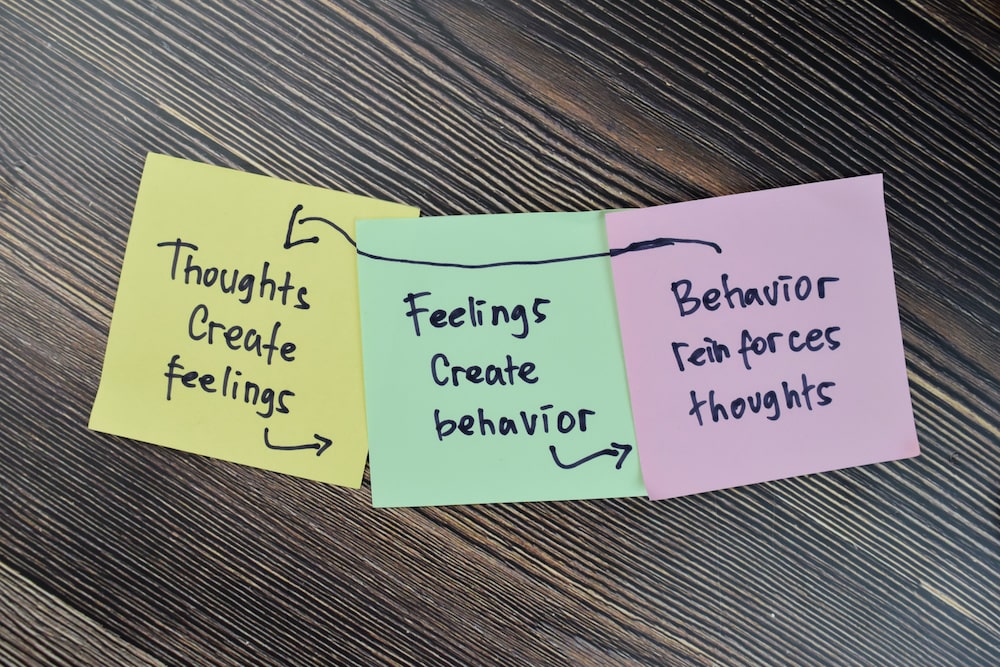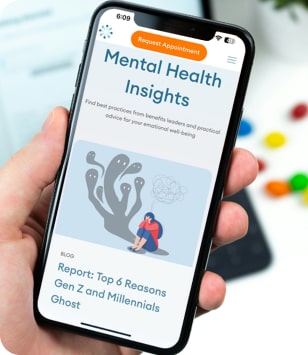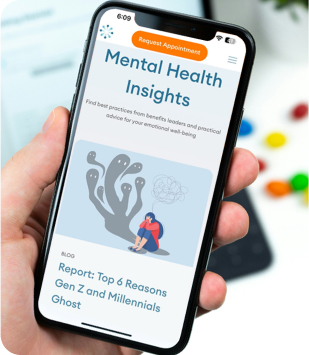What is Cognitive Behavioral Therapy?

CBT focuses on challenging the way you think. It looks to shift unhelpful thoughts that may contribute to or worsen existing emotional difficulties, like anxiety and depression. While thoughts can feel automatic and engrained in you, it’s possible to change your thinking. Through cognitive behavioral therapy, destructive thoughts are identified, challenged, and eventually replaced with objective and realistic thoughts that influence positive behavior.
Thoughts and emotions influence behavior. Subconsciously, negative perceptions and inaccurate beliefs may flood your mind from time to time. These thoughts and perceptions can contribute to emotional distress and various mental health concerns. The thoughts and resulting distress can lead to unhelpful and sometimes harmful behaviors. Eventually, these thoughts and behaviors become a pattern that repeats itself.
You can learn to deal with disruptive and harmful behavioral patterns using cognitive behavioral therapy. It’s a type of talking therapy that helps you learn how to identify and eventually change negative thought patterns that adversely influence your emotional well-being and behavior.
What Principle Underlies Cognitive Behavioral Therapy?
The basic principle underlying CBT is that most of our emotional and behavioral reactions are learned. So, if something is learned, then it can also be unlearned or changed. Whereas some forms of psychotherapy focus on life history or past trauma, cognitive behavioral therapy is concerned mainly with presently occurring feelings and events influencing your behavior. It doesn’t mean that past traumas or events won’t come up during therapy; they’re just not the central focus of CBT treatment.
So, what does cognitive behavioral therapy involve? CBT treatment is mainly focused on changing thinking patterns. The strategies may involve:
- Helping you recognize the thought distortions that could be causing your problems and re-evaluate them.
- Helping you gain a better understanding of your behavior.
- How to use problem-solving skills to cope with difficult situations when they arise rather than resulting in destructive patterns of thinking.
- Learning to develop a greater sense of confidence in your own abilities.
The treatment also involves efforts to help change behavioral patterns by:
- Helping you learn how to face your fears rather than avoiding them.
- Learning how to calm your mind and relax your body.
- Using role-playing to help you prepare for potentially harmful interactions with others so you know how to handle those situations better.
- Helping you gain a better understanding of your behavior.

How Long Does Cognitive Behavioral Therapy Take?
Dr. Alexander Alvarado, Licensed Clinical Psychologist in Manhattan, says, “CBT is a short-term therapy approach which is typically 15-20 sessions. However, this can vary depending on the diagnosis and symptoms. The reason being is that CBT is structured and often has tangible goals built into the sessions.”
Cognitive behavioral therapy typically takes the form of weekly sessions. How long the therapy last will depend on the following:
- Your situation and type of disorder
- The severity of your symptoms
- How long you’ve been dealing with the situation or experiencing symptoms
- How quickly you are progressing
- Your current stress levels
- The kind of support you’re receiving outside the therapy sessions from family and friends
Cognitive behavioral therapy sessions tend to take a specific direction that involves the following steps:
- The first step is identifying what is going on in your life. This could be an ongoing medical condition, grief, divorce, anger, or an underlying mental health disorder. Your therapist will take some time to help you decide what problems and goals to focus on.
- Next, you become aware of your emotions, thoughts, and beliefs about the problems or situations. After identifying these problems, your therapist will ask you to share your thoughts. Their role is to observe what you tell yourself about certain experiences, your beliefs about yourself, events, and other people, and your interpretation of the meaning of a specific situation.
- Identifying any inaccurate or negative thinking. To help you recognize destructive patterns of behavior that may be contributing to your situation, your therapist will request that you pay attention to your physical, behavioral, and emotional responses to certain situations.
- Reshaping destructive or inaccurate thinking. This is the final step. Your therapist will encourage you to evaluate your view on situations and decide whether that view is based on facts or inaccurate perceptions of situations. The therapist’s role is to show you how to shift from negative thoughts to positive ones. With practice, you can apply the teachings in your everyday life.
How Effective is Cognitive Behavioral Therapy?
Dr. Brian Ellison, Psy.D Doctoral Resident & Psychological Assistant in New York, says, “CBT is a great technique in treating mental health issues as it aids in applying general skills and knowledge in multi-faceted ways to address both common and complex clinical issues.
I have used CBT to positively impact the lives of many people from various backgrounds. CBT has a wealth of research-based evidence and demonstrates efficacy for many clinical issues. CBT works great for people who are results-oriented, for people who want structure, and for people who want to understand themselves and the ins-and-outs of therapy. Simply put, it is effective because it is flexible, accessible, and sensible.”
CBT has proven an effective treatment option for various mental health challenges, including anxiety, depression, eating disorders, and alcohol and substance abuse problems.
Research shows that cognitive behavioral therapy significantly improves both functioning and quality of life. Studies show that CBT is as effective as medication in some patients.
According to research, CBT is 50-75% effective in treating mental problems like depression and anxiety after about 5 to 15 sessions. For some, combining medication and CBT is a highly effective treatment option.
Because CBT focuses on identifying and shifting unhelpful patterns of thinking while learning skills to cope, CBT often results in long-term benefits. You can apply what you learn in CBT in everyday life, so it can have a positive effect after therapy sessions have finished. No matter the reason for seeking out CBT, the skills you learn there may even help beyond the original reason and can serve you in different aspects of your life.
How The Thriving Center of Psychology Can Help
Dr. Brian Ellison says, “I would not be doing this work if I did not believe that CBT was beneficial to everyone. People are agents of change, and CBT can facilitate that change. The trick lies in being able to connect with a therapist who can modify and tailor CBT to meet your lived experience, your background, and your clinical needs. CBT, when used by an expert, is a multi-tool without limits as such, everyone is able to benefit from it.”
Cognitive behavioral therapy relies on the principle that even our most profound ingrained perceptions and beliefs about ourselves, others, and events around us influence our thoughts, emotions, and behaviors. CBT has been demonstrated to help those with low self-esteem, substance abuse, eating disorders, anxiety, stress, depression, PTSD, OCD, and ADHD.
Speaking to a therapist is the first step in identifying how your perceptions influence who you are, your thoughts, feelings, and behaviors. CBT helps reshape harmful thinking by changing chow you perceive yourself, others, and situations.
If you’re struggling with a mental health problem and think you could benefit from speaking with a therapist, request an appointment online or call our offices. Our team of compassionate therapists use innovative and evidence-based approaches to treat a range of mental health conditions.

The Link Between Social Media and Depression
In today’s world, scrolling through social media is as routine as brushing our teeth. We open apps out of habit — on the train, in bed, while waiting in line. Platforms like Instagram, TikTok, and Facebook keep us connected, informed, and entertained.

Signs Depression is Taking a Toll on Your Relationship
Depression can impact every part of a person’s life, from their work to their romantic relationships. Dealing with depression can take its toll on both the person with depression and the supporting partner. If you’re worried that depression is affecting your relationship, understanding its impact is an important first step.

Anxiety Attack and Panic Attack Differences
’s easy to mix up anxiety and panic attacks. While anxiety attacks and panic attacks do have overlapping symptoms, they are different. Let’s get into the differences between anxiety and panic attacks so you can be in a better position to get the help you need.

How to Overcome Procrastination and Anxiety
Procrastination is a very typical human experience. At some point or another, we’re all guilty of putting off that task we know is important. Maybe it’s household chores, filling your taxes, paying bills, or some other mind-numbingly boring task.




